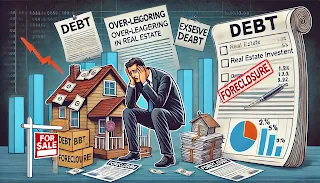The Top 10 Mistakes New Real Estate Investors Make
The Top 10 Mistakes New Real Estate Investors Make
Real estate investing can be a goldmine, but if you're just starting out, it's easy to stumble into some costly traps that can really eat into your profits. To help you navigate this exciting journey, here are the top 10 mistakes that new real estate investors often make, along with tips on how to steer clear of them.
1. Not Doing Enough Research
A lot of newcomers dive headfirst into real estate without taking the time to really understand the market. This can lead to buying in the wrong areas, overpaying, or dealing with cash flow issues.
✅ How to Avoid It:
✔ Keep an eye on market trends, job growth, and rental demand
✔ Look into property values and what similar homes are selling for
✔ Familiarize yourself with local laws and regulations
2. Overpaying for a Property
Shelling out too much cash can seriously hurt your bottom line and leave you grappling with hefty mortgage payments.
✅ How to Avoid It:
✔ Follow the 1% Rule (Monthly rent should be at least 1% of the purchase price)
✔ Compare similar properties in the neighborhood
✔ Don’t be afraid to negotiate hard before sealing the deal
3. Underestimating Expenses
Many beginners only think about their mortgage payments and overlook other hidden costs like repairs, vacancies, and property management fees.
✅ How to Avoid It:
✔ Plan for taxes, insurance, maintenance, and repairs
✔ Set aside 10-20% of your rental income for unexpected expenses
✔ Use the 50% Rule (Half of your rental income should go towards expenses)
4. Choosing the Wrong Location
You might find a fantastic property, but if it’s in a poor location, you could face low rents, high vacancy rates, or even crime problems.
✅ How to Avoid It:
✔ Look for areas with strong job markets and growing populations
✔ Check out crime rates, school quality, and access to public transport
✔ Visit the neighborhood at various times of the day to get a feel for it
5. Trying to Do Everything Alone
A lot of beginners believe they can tackle finding, financing, managing, and maintaining properties all by themselves. Unfortunately, this often results in some pretty expensive mistakes.
✅ How to Avoid It:
✔ Assemble a team (think realtor, contractor, property manager, lender)
✔ Learn from seasoned investors or mentors
✔ Connect with others at real estate meetups and online forums
6. Ignoring Cash Flow
Some investors focus on potential appreciation rather than cash flow. When the market takes a hit, they can end up losing money each month.
✅ How to Avoid It:
✔ Always make positive cash flow your top priority (Income > Expenses)
✔ Analyze deals using cash-on-cash return and cap rate
✔ Steer clear of "hot markets" where properties are overpriced and rental yields are low
7. Failing to Screen Tenants Properly
Having bad tenants can lead to missed rent payments, evictions, and property damage.
✅ How to Avoid It:
✔ Conduct credit checks, background checks, and verify income
✔ Request references from previous landlords
✔ Consider hiring a property manager if you're not experienced
8. Not Having an Exit Strategy
Many beginners overlook planning for market downturns, unexpected repairs, or personal financial issues.
✅ How to Avoid It:
✔ Develop multiple exit strategies (like renting, selling, or refinancing)
✔ Set aside an emergency fund for those unexpected situations
✔ Avoid short-term loans if you're not ready for market fluctuations
9. Over-Leveraging (Too Much Debt)
Taking on excessive debt can cripple cash flow and lead to foreclosure if things go south.
✅ How to Avoid It:
✔ Opt for low-risk financing with manageable mortgage payments
✔ Keep your debt-to-income ratio below 40%
✔ Use Other People’s Money (OPM) wisely and leverage smartly
10. Letting your emotions sway your decisions
✅ How to Steer Clear:
✔ Rely on solid data analysis (think ROI, cash flow, and appreciation)
✔ Approach investments like a business venture, not just a personal home buy
✔ Exercise patience—great opportunities often come to those who wait
Finally,
By steering clear of these common pitfalls in real estate, you can save a significant amount of money and pave the way for lasting success. Keep your focus on cash flow, do your research, and make smart financing choices, and you’ll be well on your way to building a thriving real estate portfolio over time.
👉 Ready to dive into investing? Start analyzing those deals today and steer clear of these expensive missteps!








Comments
Post a Comment